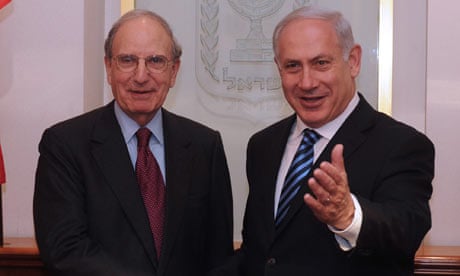Long-stalled indirect peace talks between Israel and the Palestinians resumed today, amid low expectations of success and a public warning from Israel that only face-to-face negotiations could produce an agreement.
George Mitchell, the US Middle East envoy, met the Palestinian president, Mahmoud Abbas, in Ramallah before the announcement that so-called "proximity talks" mediated by the White House had formally begun.
Saeb Erakat, the chief Palestinian negotiator, confirmed that discussions had resumed where they left off 18 months ago, when contact was broken off between Abbas and the then Israeli prime minister, Ehud Olmert, during the Gaza war.
Erakat made clear that the Palestinians would go into direct talks only if Israel implemented a full freeze on building or expanding Jewish settlements in both the West Bank and East Jerusalem – the issue that has bedevilled US attempts to get the peace process back on track.
But Binyamin Netanyahu, Israel's current prime minister, told ministerial colleagues in Jerusalem that direct talks would be needed to reach a deal. "As time goes by, we cannot reach decisions and agreements on critical issues like security and our and their interests without sitting in one room," he was reported as saying. "Peace cannot be made from afar."
Israeli media reported that the US had told Abbas that it would not unveil mediation proposals or a plan of its own before the start of direct, substantive talks on the toughest "final-status" issues of the conflict such as borders, Jerusalem and refugees.
Yesterday, the PLO executive committee announced it had given the green light to Abbas to begin proximity talks – but only after receiving US assurances that Israel will refrain from "provocative" actions. The Arab League has agreed to support four months of talks. That deadline coincides roughly with the end of Netanyahu's partial 10-month West Bank settlement freeze.
Middle East analysts generally agree that prospects for agreement range from poor to non-existent, unless or until the US gets directly involved by tabling its own detailed blueprint for peace and eventually imposing it. Each side has profound doubts about the other's ability or willingness to do a deal.
Abbas, though backed by the US and EU, is a weak leader who faces challenges from his own Fatah movement as well as a debilitating split with the rival Islamists of Hamas, who oppose negotiations with Israel and still control the besieged Gaza Strip.
Netanyahu, leading the most rightwing government in Israeli history, depends on allies who are sympathetic to the West Bank settlers and do not accept a two-state solution. Strikingly, at the same time his coalition partners on the left are stressing the urgency of making peace.
Ehud Barak, the defence minister and Labour party leader, said in a speech on Sunday: "Without an agreement we will be subject to international isolation and we will suffer a fate similar to that of Belfast or Bosnia, or a gradual transition from a paradigm of two states for two peoples to one of one state for two peoples. Some people will try to label us as being similar to South Africa. That's why we must act."
Avishai Braverman, Labour's minister for minority affairs said: "It's time to address the core issues, courageously. The talks must stop focusing on one or another [West Bank] outpost or one or another building, and we must go straight to the main big problems. We are in such a state of international isolation that if we fail to move forward to a solution of two states for two people, that isolation will weaken us significantly."
